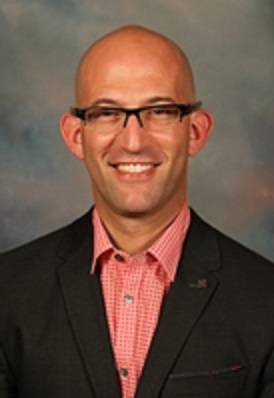
Phillip Levy, M.D., M.P.H., Edward S. Thomas Endowed Professor of Emergency Medicine, has been appointed assistant vice president of Translational Science and Clinical Research Innovation for Wayne State University. He will oversee a transformational shift that will develop centralized, horizontally integrated resources to support clinical research university-wide.
Housed in WSU's Integrative Biosciences Center, or IBio, the Center for Translational Science and Clinical Research Innovation will become the hub of campus-wide clinical research aimed at improving health and health care for Detroit and southeast Michigan. Envisioned as a partnership with the community, the center will serve as a focal point for WSU faculty to work with funding agencies and industry partners on the design and conduct of clinical research involving innovative methods, drugs and devices.
"One of our greatest strengths as an academic institution is our patient population," said Dr. Levy. "Detroiters suffer from substantial health disparities that we need to concentrate on. In conjunction with input from the community, our focus will be to improve health, and promote wellness. This will be a center for Detroit, not just a center in Detroit."
The overarching goal of the center is to work with community advisory boards to determine the direction of the university's clinical research, helping to ensure that studies and discoveries are applicable and available to community members. The center will bring new research, researchers and ideas to WSU and Detroit, and have meaningful impact on the population.
The center will provide support for clinical research across the university. Expectations are that clinical sciences grant submissions and proposals will be developed by members of specific thematic areas, under the guidance of community advisory boards, in collaboration with the center. Through the center, WSU will be aligned with, engaged in and informed by the community in its research efforts. The center will be positioned to guide the development of grants and early- to late-phase drug and device studies, as well as design and conduct epidemiological studies. It will be equipped to compile, curate and analyze massive data sets, collect and store thousands of samples in a biorepository, and perform complex biostatistics that include population-level genomic and epigenomic analyses.
"We're looking at a completely different vision: fully integrating a community and university to solve health care disparities and inequities," said Dr. Levy, who also serves as associate chair of Clinical Research for WSU's Department of Emergency Medicine. "We will have all oars rowing in the same direction. This includes our partner health care systems and the city of Detroit, with whom we are now collaborating on a number of initiatives. In short order, WSU will be the go-to source for appraisal of and solutions to regional population health issues."
Critical to the new concept is public participation in the form of "deliberative democracy" under the WSU Center for Community Engagement in Health, an extension of the Center for Citizenship founded by Marc Kruman, Ph.D., professor of History. This new entity will be co-directed by Dr. Kruman, and Malcolm Cutchin, Ph.D., professor of Occupational Therapy, Health Care Sciences in the Eugene Applebaum College of Pharmacy and Health Sciences with a mission to serve Detroit residents by fostering engagement and evaluation, "especially those of democratic action and deliberation," allowing community-based citizenship to flourish for the sake of improving public health. The program, Kruman explained, will act as a hub facilitating activities and interactions between the community and the university. It will develop avenues by which residents, WSU and other organizations can learn from each other to improve community health, assisting in the attainment of knowledge to inform new health-related practices.
As an example, Dr. Levy pointed to an effort to map blood pressure data across the city of Detroit to identify areas with concentrations of uncontrolled hypertension. Using this approach, pockets of high-risk can be targeted and community relationships can be leveraged to effect change. Working with their hypertension community advisory board, Dr. Levy's team, in partnership with the Greater Detroit Area Health Council and the Midwest Affiliate of the American Heart Association, designed an intervention to disseminate education to community members using family matriarchs and patriarchs as trusted sources of information related to high blood pressure control. "Our advisory board told us they'd like to get community leaders and family members, not health care providers, to deliver that type of education," he said. "When we hear that type of information from people we trust, it becomes more effective. We want our community to become part of a culture of health."
The center will also include an industry-facing entity aptly called Clinical Research One at Wayne (CRO@Wayne). "The goal of CRO@Wayne", Dr. Levy said, "is to provide a one-stop shop for industry partners seeking to conduct research, which can in turn lead to growth in our technology commercialization potential. Industries seeking to test new drugs and devices can contract with WSU to conduct clinical trials across a coordinated network of regional health care systems, with all operations conducted out a centralized location. As evidenced by secured contracts in excess of $3 million already for such trials, industry is hungry for such opportunity and the prospects for CRO@Wayne are promising.
"The reality is we want people to be healthy. Part of living in a culture of health is knowing why you want to be healthy. Staying healthy allows people to be vibrant contributors, to family, providing emotional and physical support, and to the tax base, which helps schools and community services, bettering the overall quality of life, and prospects for the future," Dr. Levy said. "A healthier population also decreases dependence on health care systems, reducing the amount of money and time spent on medical care, enabling direction of such resources to other community needs."
In his new position, Dr. Levy reports to Stephen Lanier, Ph.D., WSU Vice President for Research, and Jack D. Sobel, M.D., dean of the WSU School of Medicine.